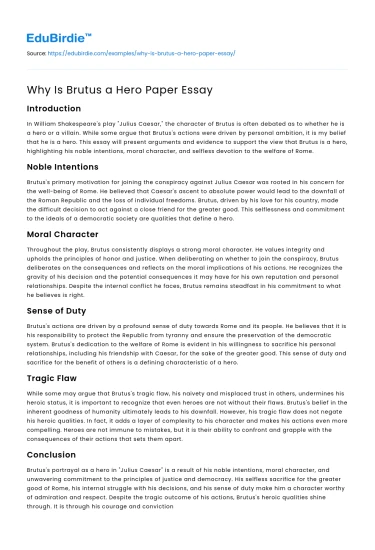Introduction
In William Shakespeare's play "Julius Caesar," the character of Brutus is often debated as to whether he is a hero or a villain. While some argue that Brutus's actions were driven by personal ambition, it is my belief that he is a hero. This essay will present arguments and evidence to support the view that Brutus is a hero, highlighting his noble intentions, moral character, and selfless devotion to the welfare of Rome.
Noble Intentions
Brutus's primary motivation for joining the conspiracy against Julius Caesar was rooted in his concern for the well-being of Rome. He believed that Caesar's ascent to absolute power would lead to the downfall of the Roman Republic and the loss of individual freedoms. Brutus, driven by his love for his country, made the difficult decision to act against a close friend for the greater good. This selflessness and commitment to the ideals of a democratic society are qualities that define a hero.
Save your time!
We can take care of your essay
- Proper editing and formatting
- Free revision, title page, and bibliography
- Flexible prices and money-back guarantee
Moral Character
Throughout the play, Brutus consistently displays a strong moral character. He values integrity and upholds the principles of honor and justice. When deliberating on whether to join the conspiracy, Brutus deliberates on the consequences and reflects on the moral implications of his actions. He recognizes the gravity of his decision and the potential consequences it may have for his own reputation and personal relationships. Despite the internal conflict he faces, Brutus remains steadfast in his commitment to what he believes is right.
Sense of Duty
Brutus's actions are driven by a profound sense of duty towards Rome and its people. He believes that it is his responsibility to protect the Republic from tyranny and ensure the preservation of the democratic system. Brutus's dedication to the welfare of Rome is evident in his willingness to sacrifice his personal relationships, including his friendship with Caesar, for the sake of the greater good. This sense of duty and sacrifice for the benefit of others is a defining characteristic of a hero.
Tragic Flaw
While some may argue that Brutus's tragic flaw, his naivety and misplaced trust in others, undermines his heroic status, it is important to recognize that even heroes are not without their flaws. Brutus's belief in the inherent goodness of humanity ultimately leads to his downfall. However, his tragic flaw does not negate his heroic qualities. In fact, it adds a layer of complexity to his character and makes his actions even more compelling. Heroes are not immune to mistakes, but it is their ability to confront and grapple with the consequences of their actions that sets them apart.
Conclusion
Brutus's portrayal as a hero in "Julius Caesar" is a result of his noble intentions, moral character, and unwavering commitment to the principles of justice and democracy. His selfless sacrifice for the greater good of Rome, his internal struggle with his decisions, and his sense of duty make him a character worthy of admiration and respect. Despite the tragic outcome of his actions, Brutus's heroic qualities shine through. It is through his courage and conviction that we are reminded of the timeless struggle between personal loyalties and the pursuit of a higher purpose. Thus, I firmly believe that Brutus is a hero deserving of our admiration and appreciation.






 Stuck on your essay?
Stuck on your essay?

